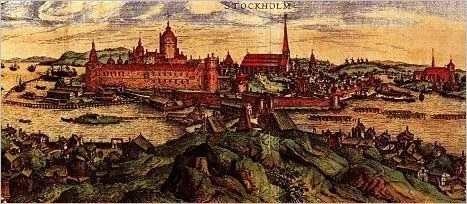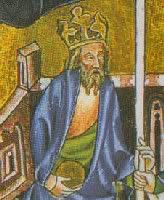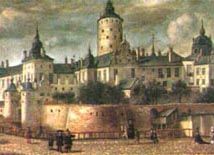The Wedding Day

In Esztergom the day had started overcast and some light rain had descended from the heavens. During the day the clouds had been thinning, until the sun finally showed itself to warm those of the guests that ventured outdoors.
In the basilica itself the day had been marked by the pomp and circumstance that such an event warranted. Many rituals had to be observed, and many nobles had gathered to witness this occassion. All of them sitting in respectful silence, while there was no conversation there was still an air of expectation in the basilica. Many saw this wedding as something that would bring greater strength and stability to the realm, no to mention a strong ally. Therefore their expectations were great.
For the bride and groom the day was one of nervous waiting for the actual ceremony, and a day of being even more at the centre of attention than usual. In an around the basilica, the guards and escorts were both hungarian and bohemian. Half wore the livery of Bohemia, and the other half wore the livery of Hungary.
When the wedding ritual finally commenced, that too was a lengthy one, all according to catholic tradition. Presiding over the wedding was the Cardinal-Archbishop of Esztergom himself. A great supporter of the Queen, his normally zealous self today seemed more comforting, perhaps making the nervousness of the couple somewhat lesser.
For Mária this was a day she had both looked forward to and dreaded more than anything else in the world. While the marriage would be good for the Kingdom as a whole, and Jan was certainly both a good person and an excellent match for a husband, the young Queen fealt wholly unprepared for it.
A mere year ago she had but been a girl, even though a Princess and one that had been chosen for a throne. That had been simpler times, and times of less worries. Now she was the Queen, and soon the Kingdom would have a King. Still she fealt like the little girl she had been a year ago, and still sometimes longed to be that girl again. Looking at Jan she wondered what he was feeling, and realized that he might have been as nervous as she was. She tried smiling reassuringly to him, but after a short while her gaze lowered and rested on the floor.
Jan was obviously nervous aswell. He wasn’t been exactly sure why he is nervous. She was a fine bride and nice half of kingdom to rule, yet there was something...something that gave him no rest. He looked back on bride and smiled aswell before he let his look slide somewhere upwards where he kept his look for very much of rest of the whole ceremony. Even though he respected the very grave atmosphere of wedding his mind was buzzing with thoughts. About bride, kingdom...everything.
Finally the ceremony was coming to an end, and the words the assembled guests had waited for was finally said. And perhaps the words the bride and groom was the most afraid of. Looking at both of them like wise and benign father, the Cardinal-Archbishop nodded.
"You may now seal your vows."
In the basilica itself the day had been marked by the pomp and circumstance that such an event warranted. Many rituals had to be observed, and many nobles had gathered to witness this occassion. All of them sitting in respectful silence, while there was no conversation there was still an air of expectation in the basilica. Many saw this wedding as something that would bring greater strength and stability to the realm, no to mention a strong ally. Therefore their expectations were great.
For the bride and groom the day was one of nervous waiting for the actual ceremony, and a day of being even more at the centre of attention than usual. In an around the basilica, the guards and escorts were both hungarian and bohemian. Half wore the livery of Bohemia, and the other half wore the livery of Hungary.
When the wedding ritual finally commenced, that too was a lengthy one, all according to catholic tradition. Presiding over the wedding was the Cardinal-Archbishop of Esztergom himself. A great supporter of the Queen, his normally zealous self today seemed more comforting, perhaps making the nervousness of the couple somewhat lesser.
For Mária this was a day she had both looked forward to and dreaded more than anything else in the world. While the marriage would be good for the Kingdom as a whole, and Jan was certainly both a good person and an excellent match for a husband, the young Queen fealt wholly unprepared for it.
A mere year ago she had but been a girl, even though a Princess and one that had been chosen for a throne. That had been simpler times, and times of less worries. Now she was the Queen, and soon the Kingdom would have a King. Still she fealt like the little girl she had been a year ago, and still sometimes longed to be that girl again. Looking at Jan she wondered what he was feeling, and realized that he might have been as nervous as she was. She tried smiling reassuringly to him, but after a short while her gaze lowered and rested on the floor.
Jan was obviously nervous aswell. He wasn’t been exactly sure why he is nervous. She was a fine bride and nice half of kingdom to rule, yet there was something...something that gave him no rest. He looked back on bride and smiled aswell before he let his look slide somewhere upwards where he kept his look for very much of rest of the whole ceremony. Even though he respected the very grave atmosphere of wedding his mind was buzzing with thoughts. About bride, kingdom...everything.
Finally the ceremony was coming to an end, and the words the assembled guests had waited for was finally said. And perhaps the words the bride and groom was the most afraid of. Looking at both of them like wise and benign father, the Cardinal-Archbishop nodded.
"You may now seal your vows."
(OOC: Post has been written with Green Alien)




































